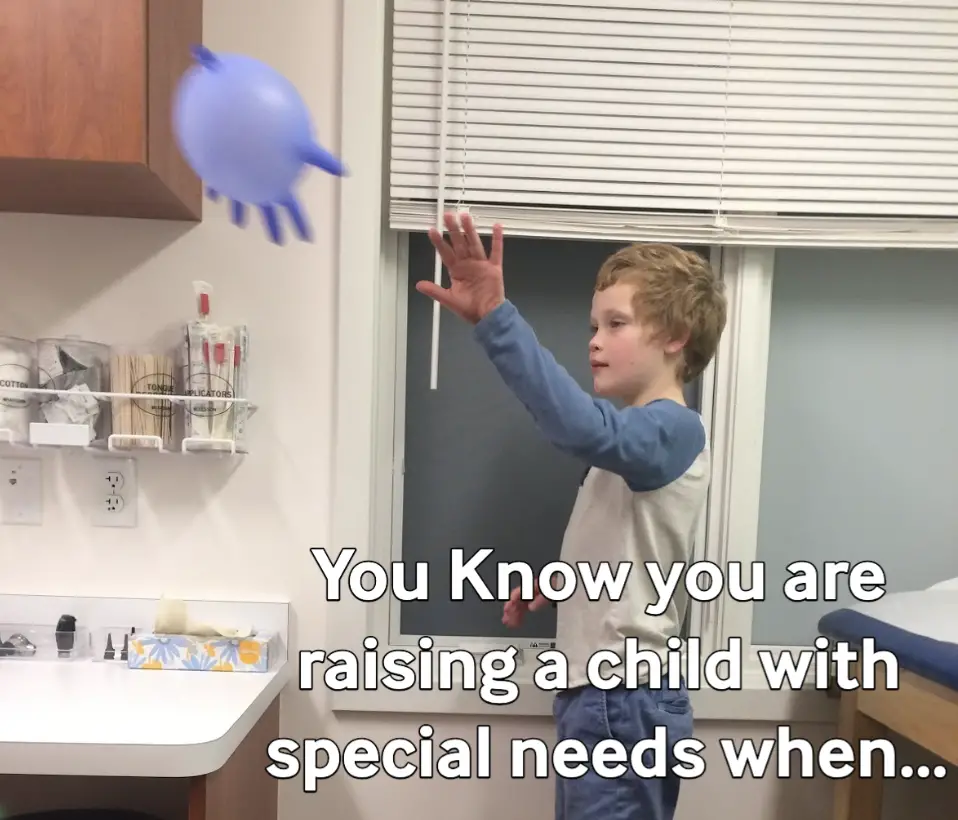You are an expert on weird things by necessity. A random smattering of examples includes: expertise in distinguishing between poop and chocolate, what kinds of food, toys, electronic devices and clothes to pack in your car when you go anywhere, how to entertain your child in the dr’s office when you forget to pack said items, what types of seat belt locks actually work to keep an angry child in his seat in the car, and along those lines, what types of locks work on door knobs to keep a curious child from escaping homes or yards. I have friends who have become experts in more serious things like childhood development, and they have made careers out of their expertise. I also have friends who have become experts on therapy dogs, antipsychotic drugs, natural herbal supplements, and hair cutting techniques for special needs kids.

You are usually tired. From sleepless nights (literal all nighters) to exhausting daily routines, you have little energy to spare. Many special needs children require around the clock “eyes and ears” as well as medical attention. You are not only physically tired, but emotionally drained as well. The range of emotions I felt just last week while my son was being sedated to have his teeth cleaned touched every extreme: anxiety, frustration, relief, heartache, pity, boredom, and gratitude. You most likely have dark circles under your eyes that no amount of concealer can hide.
You feel isolated a lot. It can be hard to listen to conversations at the bus stop or at lunch with friends after dealing with an aggressive child or an ongoing problem at school. While you anxiously check your phone or play the last frustrating moments with your child over and over in your head, it can be hard to relate to others, and sometimes it’s easier to check out. Just like exhaustion, the isolation you feel has both emotional and physical elements. While you would love to be able to jaunt out your front door anytime you feel like it, you can’t. And while you would love to load your family into the car to head to a restaurant or movie, you can only dream. Amusement parks, shopping malls, grocery stores, public swimming pools, and any public place where you’re expected to behave according to certain social norms pose problems as well. Unless you have access to very good and cheap babysitters (or better yet, capable and nearby family support – I can only dream…), you most likely find yourself at home — often alone.
Your raw emotions are often on the surface. The list of locations I have cried at while attending to my son’s needs include: his school, his dentist’s office, his many doctor’s offices, the lab to have bloodwork done, the store, his bus stop, our neighborhood, the park, our car, the bathroom (at home and in public), several airplanes, many different airports, and a certain ferry in Seattle. To my fellow special needs parents: I wouldn’t recommend taking a hyperactive child on a ferry ride in Seattle. Or any ferry ride if you can help it! Trust me. I was once so frustrated after a plane ride with my son that I told a staring passenger to take a picture because it would last longer. Ironically, we had just landed in Seattle. Don’t get me wrong, I do love Seattle. I’ll blame the bad experiences on people being extra grumpy because of the rain. So don’t feel shy about letting those tears flow when they have to. It happens to the best of us.
Others are often afraid to talk to you about your special needs child. People are often afraid of offending you by asking you questions about your child. I don’t know about you, but I don’t get offended by sincere and well meaning questions – or even just honest curiosity. You may find yourself teaching friends correct terminology and politically correct dialogue in order to help them feel more comfortable. You may also need to set aside time to talk to others when your child is not within earshot. As you know, extraordinary kids often have higher comprehension skills than you realize, and you have learned how to be sensitive to potentially embarrassing situations for them. Your special needs child may be higher functioning or might be blessed with a high IQ, and he/she does not want to be treated differently.
People often tell you, to your chagrin, that you’re a special parent. I do think you are incredible, obviously. The rumor that I’m trying to stamp out here is that you are blessed with superhuman powers to care for your special needs kids. I’ve heard it many times. It’s always well meaning, so it doesn’t cause offense. But I’m really not gifted with superhuman powers, and the sooner others can understand that, the sooner they can understand me and my difficulties. Like parents of typically developing children, you and I are simply doing the best we can with the tools that we have been given. Yes, there have been particularly difficult times for my family when I’ve felt that I received extra help from above, but that help was given to a very average parent (me) just doing her best. Simply put, you are a parent with some unique challenges and experiences.
You have financial burdens. You are probably sacrificing financially for your special needs child to a significant degree. Maybe you would have been able to afford that down payment on that home in that neighborhood you love, but you’ve spent all of our savings on expensive therapies. Or maybe you have to pack up your home and family and move to a different state where financial burdens are lighter. Some of you have been able to receive financial help through government programs, but most of you haven’t. It’s a terribly hard process. Unfortunately, financial issues often lie at the heart of many of your struggles, and until mental health issues in general garner more public attention and government financial support, this issue won’t change. While this isn’t something many of you talk about, it can weigh on you heavily. Most of you can’t just hire a babysitter when you need a break or call a housekeeper when the house gets messy, so be kind to yourself and give yourself a break.
Sometimes you wish your life was different. You love your extraordinary child fiercely and wouldn’t change a single hair on his head. That doesn’t mean, though, that sometimes you long for less pain and suffering for your child and for yourself. I recently read about a special needs mom who was kicked out of an autism facebook group for commenting that she wished her child could talk to her for just 24 hours, so she could know what he was thinking and feeling. Collectively, the group felt that she should just accept her child the way he was. This is an example of total misunderstanding on the part of the group. It’s not that you wish your child was different. You truly love her distinctive character traits and qualities, idiosyncrasies, noises, and mannerisms. What you long for (sometimes unproductively) is less struggle. It can be hard as a special needs parent to be optimistic, and that’s OK. I’ve never been dubbed a pillar of positivity, but I have been known to keep things real, and I think I’m in good company.
The “simple” parts of parenting are complicated for you. I know they are complicated for you, because most mundane tasks are surprisingly complicated for me. Anytime my child has an earache, a toothache, needs a nose swab, has to get his blood drawn, or has to have his blood pressure checked, it takes at least 3 people to hold him down (often unsuccessfully). Someone usually gets bitten or kicked or head butted. Even getting his height and weight at the doctor’s office is difficult. Doctor’s visits aside, anytime I have to fill out paperwork for him, it feels like reading Moby Dick in its entirety. Taking him to church is complicated. Taking him to the store is complicated. Taking him to the woods to go on a hike is surprisingly easy! It’s possibly the only activity we do as a family that isn’t complicated. Just like I celebrate these small victories, I know you do as well.
You value the support of friends and family. A sincere offer of help is highly valued. When others show interest in your extraordinary child by asking questions, you appreciate it. When good friends acknowledge that your daily life is complicated, or that you seem rundown or sad, their sympathy speaks volumes. Offers to help out with other children in your home helps you focus on your special needs child who may need extra attention, while also giving your other children a much needed break. You may not be able to express your appreciation adequately, but it is always there.







Leave A Comment